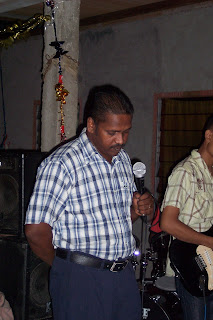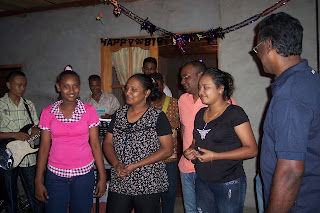We've been greatly impacted by several materials by Ken & Corlette Sande. Ken is a lawyer, and has been using biblical principles for resolving conflict and bringing reconciliation in his own family, and as a ministry to help resolve personal conflicts, business disputes, church & ministry divisions, and complicated lawsuits.
Sande was really helpful in showing me my own sin of a critical, judgmental attitude, and pointing out exactly what its roots are. Here is a very searching excerpt from his booklet Judging Others: the Danger of Playing God:
"A key step in breaking free from the habit of making critical judgments is to trace them to their source and cut them off at the root. To do this you must deal with your heart. James 4:1-12 describes two of the most common sources of critical judgments. The first is selfishness. When others stand in the way of what we want, we strive to remove their opposition by tearing them down and diminishing their credibility and influence in any way we can (vv. 1-3).
"Pride is another source of critical judgments. Thinking that we are better than others, we set ourselves up as their judges and begin to catalog their failings and condemn their actions. As we saw earlier, when we do this we are imitating Satan by trying to play God (vv. 7, 12). Pride can also reveal itself in the inclination to believe that “I alone understand the truth about things.” I think that my beliefs, convictions, theology, and doctrines are true, and I look down on anyone who disagrees with me (cf. Gal. 5:26).
"Matthew 7:3-5 shows that self-righteousness is another root of critical judgments. When we have done something wrong but we do not want to admit it, one of the most natural things we do is to draw attention to and even magnify the failures of others.
"Insecurity, which is a form of the fear of man, is a related root of this problem. When we lack confidence in our own beliefs and positions, and fear that they might be disproved, we often conclude that the best defense is a good offense. Therefore, we lash out at others’ views and judge them before they can judge us.
"Jealousy can also lead to critical judgments. As we see in Genesis 37:11, Joseph’s brothers were jealous of his close relationship with God and his father, and they repeatedly interpreted his motives and actions in the worst possible way. As their jealousy grew, it culminated in their selling him into slavery.
"Another cause is self-pity. On occasion, many of us find a perverse pleasure in feeling sorry for ourselves. Therefore, we tend to interpret situations in a way that hurts us the most.
One of the best ways to do this is to interpret others’ actions as a form of betrayal.
"Prejudice is frequently a cause of critical judgments. When we have preconceived, unfavorable opinions about others simply because of their race, religion, gender, or status in life, we will consistently seek to validate our views by interpreting their beliefs and actions negatively.
"Unforgiveness can also lead us to look for the worst in others. If someone has hurt us, and we do not forgive him, we will look for ways to justify our unforgiveness. Finding more faults in the person who hurt us is a convenient way to conceal the hardness of our own heart.
"Of course, the ultimate source of critical judgments is a lack of love. Where love is deficient, critical judgments will be the norm. Conversely, where love abounds, charitable judgments should abound (1 Cor. 13:4-7).
"Think for a moment of the wide spectrum of love you have for different people. There are probably some people in your life whom you love greatly. Usually these people have blessed you in some way. You appreciate and respect them so much that when others criticize them, you automatically think or say, “Oh, that could not be true!” No matter what they are accused of, you instinctively believe that there must be a good explanation for what they have done.
"At the other end of the spectrum are people whom you love very little. They may have disappointed you, disagreed with you, hurt you, or blocked something you desired. If you are like most people, you are quick to find fault with them. You grab onto critical reports like Velcro and dismiss favorable reports like Teflon. No matter what these people do, it is difficult for you to acknowledge good in them.
"What is it that separates these people in our hearts and minds? What is it that places them on the opposite ends of our rating system? Sometimes the difference arises from fundamental differences in their characters. Some people are simply more virtuous and likeable than others. But in many cases the difference is found not in these other people, but in our attitudes towards them. If someone has not benefited me, agreed with me, supported me, fulfilled me, satisfied me, or otherwise demonstrated love for me, I am not inclined to love him—or to judge him charitably.
"Unless God does major surgery in our hearts, these attitudes will continue to control our judgments and destroy our relationships. The good news is that God is ready to operate."
I've had to go back an apologize to people I've hurt by my wrong responses to conflict. I want to honor Christ by living at peace with others.
We tend to run away from conflicts (such as avoiding the person, or pretending there's nothing wrong while we continue to think about the problem, ending a friendship, moving to a different church, divorce, etc.)--Sande calls this "peace-faking" responses. Or we tend to lash out in anger (verbal attacks, quarreling, gossiping, destroying the person's character, using fists, suing in court, etc.)--Sande calls these "peace-breaking" responses. Both of these responses are dishonoring to God.
Instead, Sande gives several "peacemaking" responses to help resolve the conflict & restore the relationship. He outlines many practical principles to use; these are not drawn from mere human insights, but from the Word of God. He uses many biblical references & quotes, and spells out how we can apply them practically in resolving our conflicts.
I appreciate Sande's realism: wherever people are, there will be conflict. And that includes the church; because we are sinful people, we will have conflict in our churches. We fight over differences in doctrine, order in the service, personal offenses, not being treated as we think we ought to be, being overlooked, under-appreciated, buildings & property, which songbook or songs to use, etc, etc, etc. Or we just pretend there's no problem, and continue faking until we can't stand the problems anymore, and run to some other church. I'm sure you know personally of different conflicts in your own church, or churches you've been a part of in the past. It is necessary, therefore, that we be prepared to handle our conflicts in a biblical, God-honoring fashion. Sande does a good job of fleshing out what that looks like.
Also, we will have conflicts in our marriages, our families, and between our children--again, because we are sinful, selfish people. Sande also shows how to apply God's principles of peacemaking in these relationships. We are already applying the biblical principles we've learned, and will definitely continue using them in the future.
Sande also deals with a very touchy, but important subject: how to speak to others about their sins. Here again, we tend to either flee or fight, either ignore the problem & say nothing, or come down harshly & cast our brother's sin in his face. (And often we exaggerate lesser matters to cause division; where we ought to give liberty, we give law, and judge our brother, trying to force him to our personal convictions.) Here, Sande helps us with some clear, biblical principles for dealing with sins in others. The goal is restoration, not condemnation. We must deal truthfully AND graciously; ignoring the problem is not the most gracious thing, and denouncing our brother or demanding repentance is not the most truthful thing.
You can read Sande's booklet
Judging Others: the Danger of Playing God online. It was published in three parts on the following pages:
Part 1;
Part 2;
Part 3


































